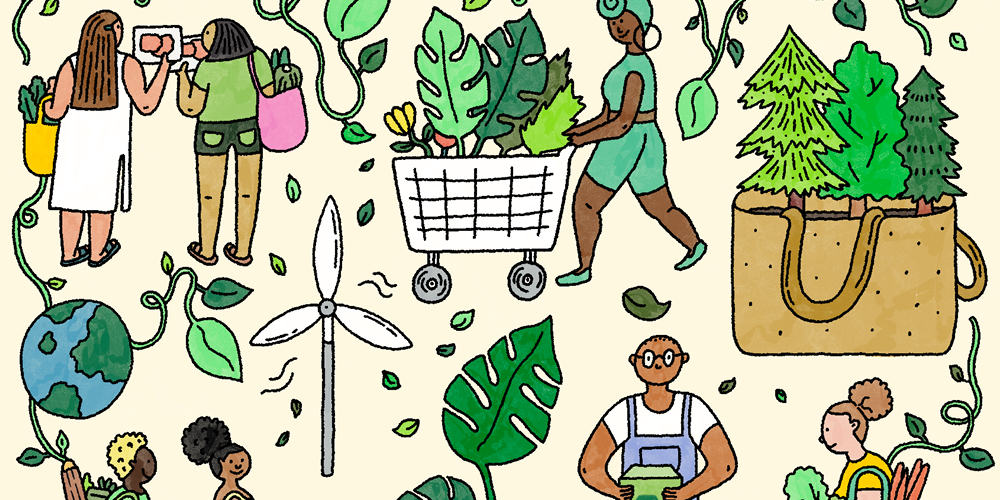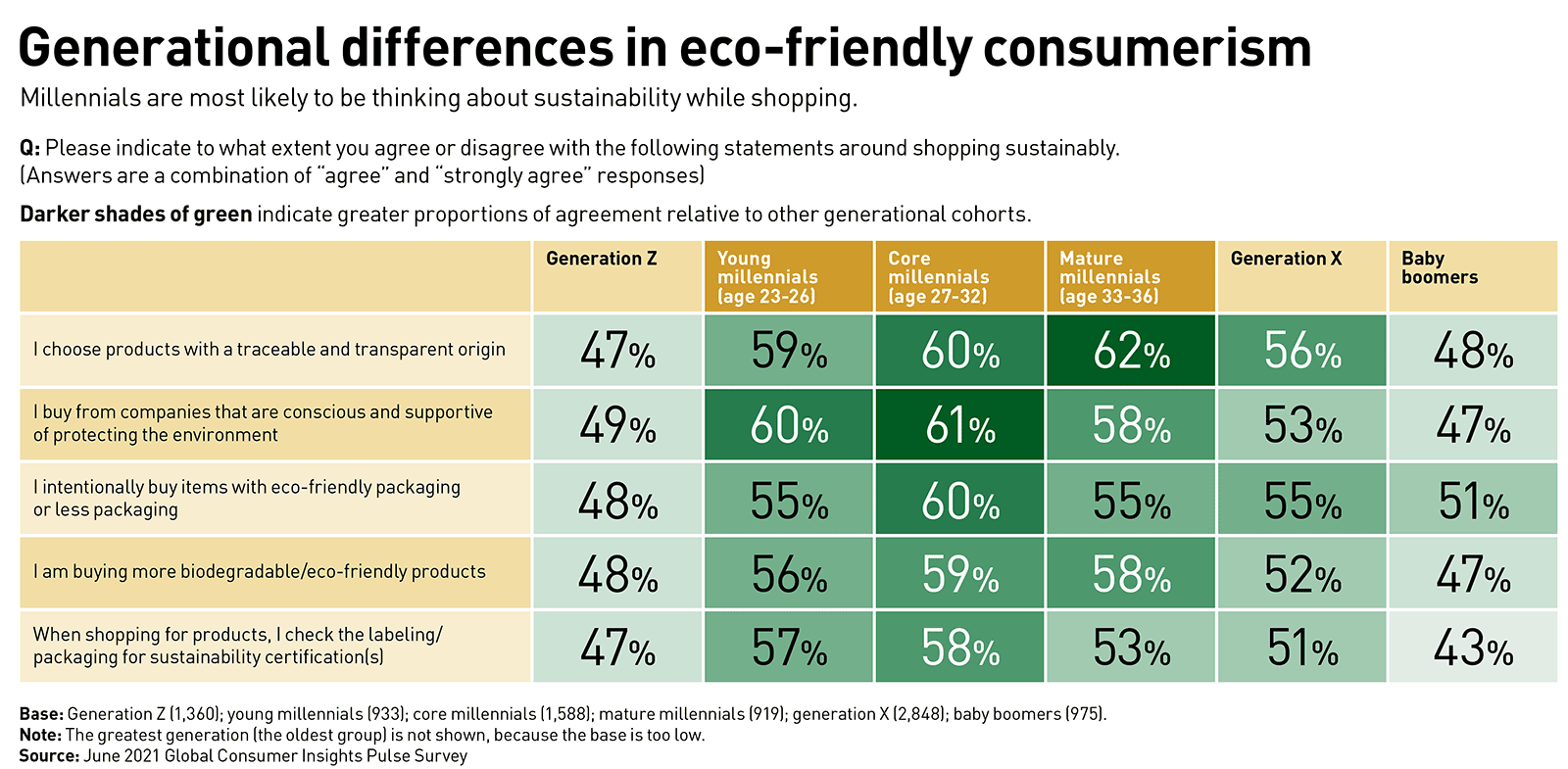The rise of the eco-friendly consumer
During the pandemic, people have become more sensitive to the environmental impact of their shopping decisions—and companies are responding.
A version of this article appeared in the Autumn 2021 issue of strategy+business.
At the height of the COVID-19 pandemic, consumers might have run low on toilet paper or flour, or might have searched online in vain for an inflatable backyard pool. But there was one thing in endless supply for many stuck at home: time. And given more time to contemplate everyday actions and choices, a lot of people started focusing on the environmental impacts of their purchasing decisions. Before the pandemic, consumers had begun to prioritize sustainability. But in PwC’s June 2021 Global Consumer Insights Pulse Survey, half of all global consumers surveyed say they’ve become even more eco-friendly.
In our 2019 Global Consumer Insights Survey, just 35% of respondents said they chose sustainable products to help protect the environment, 37% said they looked for products with environmentally friendly packaging, and 41% said they avoided the use of plastic when they could. PwC’s survey results show percentages ten to 20 points higher in response to similarly worded questions. A study by creative research platform Visual GPS, in conjunction with market research firm YouGov, also indicates a shift during the pandemic. That survey finds that 81% of people polled expect companies to be environmentally conscious in their advertising and communications, and 69% of respondents said they were doing everything possible to minimize their carbon footprint (up from 63% just a year earlier).
All over the world, business leaders and analysts have been pondering which of the consumer behaviors accelerated by the pandemic will persist and deepen and which will recede. PwC’s survey, conducted more than a year after the first outbreak of COVID-19, suggests that eco-friendly consumerism is here to stay.
Consumer packaged goods companies, retailers, and grocers have long been paying attention to their customers’ growing demand for eco-friendly products. As businesses continue to launch eco-friendly innovations in products, packaging, and production, some nuances in PwC’s consumer data might help leaders chart a path forward.
Key survey findings
PwC’s survey reveals that consumers in the Asia-Pacific region are more eco-friendly than the global average, and a large majority of respondents report becoming more eco-friendly. In Indonesia, it's 86%, and in Vietnam and the Philippines, it's 74%. The trend is also prevalent in the Middle East. In Egypt, 68% say they’re more eco-friendly, and in the United Arab Emirates, it’s 67%. This suggests that sustainability messaging should have amplified resonance in those regions.
There has also been substantial movement within demographic cohorts (see chart). Millennials showed the most change. Fifty-eight percent of “core” millennials (those ages 27 to 32) surveyed by PwC say they’ve become more eco-friendly. Core and “young” millennials (those ages 23 to 26) are also the most likely to agree that they consciously consider sustainability while shopping. Generation Z’s commitment to eco-consumerism lags that of millennials, which might have to do with perceptions that it’s more costly or difficult to shop sustainably (see chart).
Those working from home are also more likely to shop sustainably. More than half (56%) of those surveyed who work from home say they’ve become more eco-friendly, compared with 48% of those who work away from home.
But certain concerns do trump sustainability. According to PwC’s survey, consumers are slightly more concerned about health and safety than they are about the environmental impact of their purchasing decisions. This is likely an effect of the pandemic. When it comes to buying single-use plastics and other disposables (e.g., face masks, paper towels, disinfecting wipes, and gloves), just over half (51%) of global shoppers say their concerns over health and safety outweigh their sense of environmental responsibility.
Sustainability skeptics
Although eco-consumerism is clearly on the rise, PwC’s most recent survey reveals that some consumer segments haven’t fully embraced sustainable shopping: 44% of survey respondents say they have no opinion about or disagree with three or more statements about shopping sustainably. These less environmentally conscious consumers, or “sustainability skeptics,” have certain characteristics in common. They are more likely to work away from home, to be young, and to be driven by convenience when choosing how to shop, and they are less likely to perceive themselves as having evolved as consumers across other areas.
Sustainability skeptics identify various reasons for their stances. Forty-four percent say sustainable products are priced too high. Other reasons survey respondents cite for not choosing sustainable products are lack of quality, limited product availability, and lack of time to seek out these options.
Leading with eco-innovations
Despite undercurrents to the rising green tide, it’s likely that consumers will continue to embrace more sustainable practices, especially as companies make sustainable choices more affordable and accessible and as they set an example for how to be responsible stewards of the earth’s resources.
In PwC’s June 2021 Global Consumer Insights Pulse Survey, half of all global consumers say they had become even more eco-friendly.
Through a recent partnership with the Consumer Goods Forum (CGF), PwC learned more about the holistic approaches that many consumer goods companies and grocery retailers are using to reduce the environmental impact of their products while also lowering costs. The CGF and the industry as a whole have set ambitious goals for cutting greenhouse gas emissions, reducing or eliminating plastic waste, minimizing food waste, and improving crop sustainability. And companies are taking other meaningful steps to become more eco-conscious throughout their operations.
For example, Grupo Éxito, a Colombian food retailer, is incentivizing cattle farmers to reforest recently cleared land. The company uses satellite surveillance and audits to verify that cattle farmers are making progress in planting trees and adhering to other environmental and social equity standards. Those that comply are paid a premium by consumer companies for their meat and earn a “sustainable meat” seal, for which shoppers are then willing to pay extra, according to CEO Carlos Mario Giraldo.
Another manifestation of sustainable sourcing is the adoption of new kinds of farming, such as vertical farming (the practice of growing crops in vertical layers), and indoor and AI-assisted farming. US retailer Kroger has partnered with US company 80 Acres Farms to operate four indoor farms with robots that monitor crops 24 hours a day, seven days a week. 80 Acres Farms says its farms produce 300 times more food than a conventional farm, using 97% less water and 100% renewable energy.
Companies are working on sustainable packaging, too. A.S. Watson Group, an international health and beauty retailer, has been a recycling pioneer. The company eliminated microplastics in its cosmetics and personal care products in 2014 and was the first to use recycled plastic in its bottled water business in Hong Kong. It also introduced the first reverse vending machine to collect used plastic bottles in the city, and this year it is launching aluminum bottles that are 100% reusable and recyclable. Alibaba Group is trying to address packaging waste by installing pickup stations across China where consumers can get their goods. Customers are encouraged to open their parcels on-site and leave the packaging there, or drop unwanted shipping boxes at one of thousands of recycling stations. And the Coca-Cola Company has a “World Without Waste” initiative, which aims to make its packaging 100% recyclable by 2025, collect and recycle a bottle or can for each one sold, and use 50% recycled material in its bottles and cans by 2030. For Coca-Cola CEO James Quincey, the key is focusing on the parts of the business where, as a corporate leader, he can wield the most control and can have the greatest impact.
Consumer goods companies are also trying to reduce their environmental impact from the start of the product life cycle. Procter & Gamble employs hundreds of chemists who are working to develop new laundry detergent formulations that allow clothes to get clean in cold water while reducing wear and tear. In some situations, advanced chemistry is being applied to address environmental concerns, such as reducing the water content of detergents and other products, creating cleaner products free of worrisome chemicals, and converting more plastic packaging to paper. The process of making products more eco-friendly is not something that can be bolted on, P&G CEO David Taylor notes. It must be built in from the start.
From trend to inflection point?
As we can see clearly now, through both research and anecdotal evidence, the pandemic accelerated and strengthened many consumer trends. The quest for greater sustainability in products is certainly one such trend. But perhaps it should no longer be considered a trend at all. Instead, we can view it as an inflection point.
Neither consumers nor companies seem inclined to backtrack on their environmental commitments, especially in light of worsening climate change. And as the emphasis on sustainability continues to intensify, companies will want to continue to focus on innovations that please consumers and are good for business while doing as little harm to the planet as possible.



